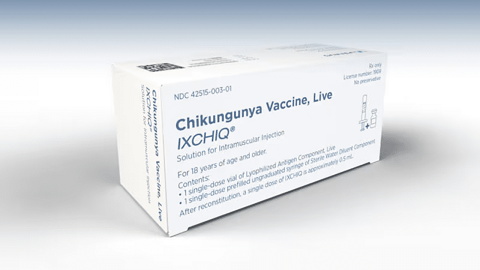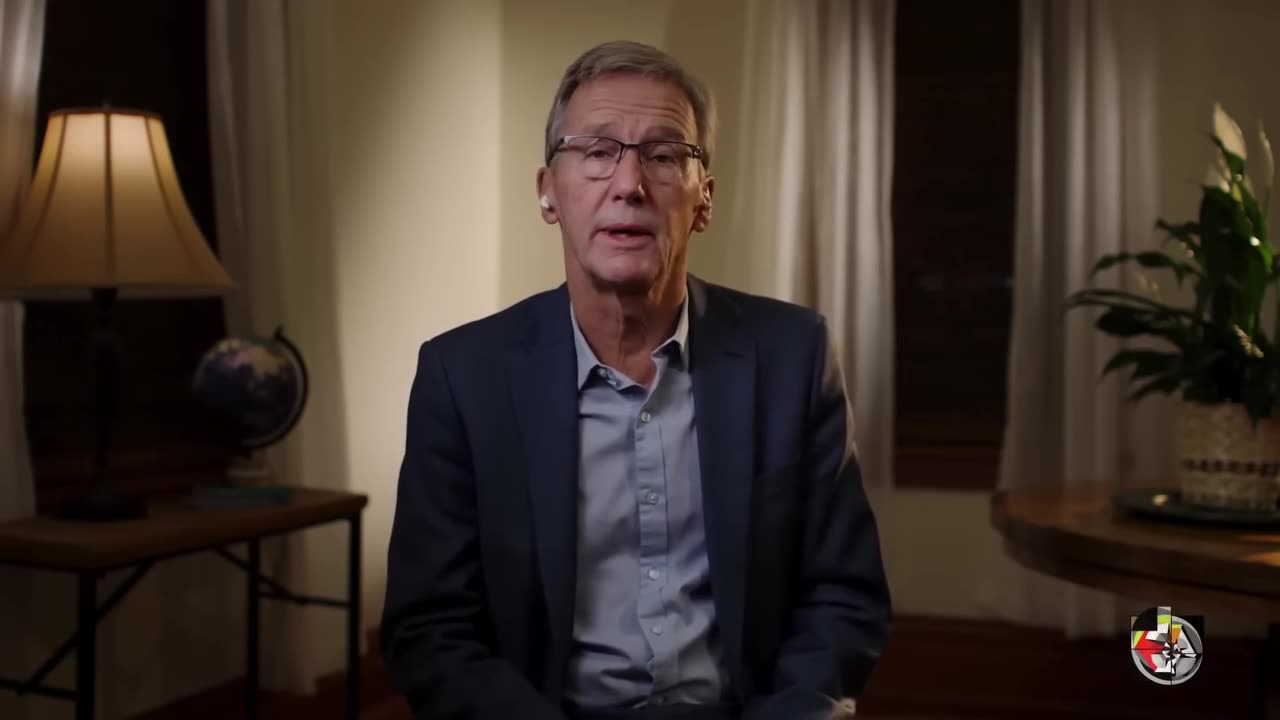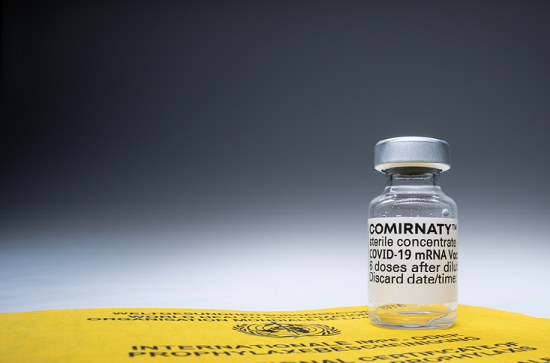On May 9, 2025, the U.S. Food and Drug Administration (FDA) and the U.S. Centers for Disease Control and Prevention (CDC) recommended a temporary pause in the use of Ixchiq, a live virus vaccine designed to prevent chikungunya virus infection, in adults aged 60 years and older. The recommendation follows reports of serious post-marketing adverse events, including neurological and cardiac complications, in individuals within this age group who received the vaccine.1
The FDA’s announcement came just days after the European Medicines Agency (EMA) temporarily suspended the use of the new chikungunya vaccine on May 7, 2025.2
Chikungunya is a viral illness spread through the bite of infected Aedes mosquitoes. The disease causes symptoms such as fever, intense joint and muscle pain, headache, nausea, fatigue, and rash. It is most commonly found in tropical and subtropical regions around the world.3
According to the CDC, Ixchiq is a live attenuated vaccine manufactured by Valneva Austria GmbH. It is approved for use in adults 18 years and older and is administered as a single dose. The CDC recommends the vaccine for adults traveling to countries or territories where chikungunya outbreaks are occurring.4
Serious Adverse Events Including Two Fatalities Linked to Ixchiq Vaccine
As of May 7, 2025, 17 serious adverse events have been reported globally in individuals aged 62 to 89 who received the Ixchiq vaccine during post-marketing use. Two of these events resulted in death. An 84-year-old man died from encephalitis, while a 77-year-old man with Parkinson’s disease passed away after his swallowing difficulties worsened, potentially leading to aspiration pneumonia. Both fatalities occurred in La Réunion, a French overseas department, where a vaccination campaign is underway following a recent chikungunya outbreak.5
Six Ixchig vaccine adverse event reports came from the United States. According to the Vaccine Adverse Event Reporting System (VAERS), most of the serious adverse events, both in the U.S. and abroad, involved individuals with underlying chronic medical conditions. To date, approximately 80,000 doses of Ixchiq have been distributed worldwide.6
According to the FDA, since Ixchiq is a live, attenuated vaccine containing a weakened form of the chikungunya virus, it has the potential to cause side effects similar to the symptoms of chikungunya disease itself. Post-marketing reports have documented adverse reactions that mirror severe complications of chikungunya, leading to hospitalizations. The FDA-approved prescribing information for the vaccine includes a warning indicating that the vaccine may trigger severe or prolonged reactions resembling those of chikungunya.7
The EMA said that due to the fact that studies on Ixchiq primarily involved individuals under 65 years of age, and considering that most serious cases have been in those 65 and older, it is recommending a temporary restriction on the vaccine’s use. While a safety review continues, Ixchiq will be contraindicated for adults aged 65 and older.8
Ixchiq Vaccine Approved Under FDA’s “Accelerated Approval” Pathway
Ixchiq vaccine received FDA approval for use in the United States on Nov. 9, 2023 for the prevention of chikungunya, a mosquito-borne virus characterized by fever and joint pain. The Mayo Clinic recognizes that the virus rarely causes serious problems or death, and most people who contract the virus recover within a week, although the joint pain can persist for months or years. To manage any lingering joint pain, patients are often prescribed arthritis medications, which carry risks separate from the live vaccine, such as gastrointestinal bleeding, liver damage, or increased cardiovascular risk.9
The approval of the vaccine was conducted via the FDA’s Accelerated Approval pathway, which allows the regulatory agency to approve drugs or vaccines for serious or life-threatening conditions more quickly. This fast-track approval is based on evidence suggesting the new vaccine is likely to provide clinical benefits, even though additional studies are still needed to confirm its effectiveness. In the case of Ixchiq vaccine, the FDA reviewed data showing that the vaccine triggered a strong immune response in clinical trials. However, to fully verify its benefits, the FDA required the company to conduct further clinical studies and post-marketing surveillance.10
Ixchiq vaccine was also given “Fast Track” and “Breakthrough Therapy” designations, both of which aim to speed up the approval process for treatments. Additionally, the manufacturer received a “Priority Review” for the vaccine, which means the FDA fast-tracked its evaluation. As part of the approval process, the FDA awarded the company a tropical disease priority review voucher, a program designed to encourage the development of treatments for diseases that are common in tropical areas.11
Some Serious Reactions Reported in Clinical Trials
In clinical trials conducted in North America, the manufacturer evaluated the safety of Ixchiq vaccine in approximately 3,500 adults aged 18 and older who received the vaccine. One of the studies also included an estimated 1,000 people who underwent a randomized, double-blinded, placebo-controlled trial in which the control group received an actual inert placebo injection. This approach contrasts with the methodology used in many other vaccine trials, where so-called bioactive “placebos” are typically an adjuvant or another vaccine, both of which can carry their own respective risks and undermine safety trial data on an experimental vaccine or new biological. Among those given Ixchig vaccine, the most commonly reported side effects were headache, fatigue, muscle and joint pain, fever, nausea, and soreness at the injection site.12
Rare, more serious side effects resembling chikungunya symptoms did occur. Approximately 1.6 percent of vaccine recipients experienced severe reactions that interfered with daily activities or required medical care. None of the placebo recipients reported similar issues. Two people were hospitalized due to these severe reactions, and some individuals reported symptoms lasting 30 days or longer.13
Valneva Points to “Underlying Conditions” and “Other Drug Interactions” as Possible Causes for Reactions
Valneva said in response to the FDA safety announcement that it is “upholding the highest safety standards.” The company suggests that the reported reactions may be related to recipients’ underlying health conditions or interactions with other medications. According to the American Hospital Association, nearly half of Americans have at least one chronic condition, and 42 percent have two or more. With nearly half of all Americans living with one or more chronic conditions and nearly 70 percent taking at least one prescription medication, it is difficult to determine what role these underlying conditions played in adverse health outcomes following vaccination.14
The FDA says it will conduct an updated benefit-risk assessment for the use of Ixchiq vaccine in individuals 60 years of age and older and continue the evaluation of post-marketing safety reports for the vaccine.15
If you would like to receive an e-mail notice of the most recent articles published in The Vaccine Reaction each week, click here.
Click here to view References:1 U.S. Food and Drug Administration. FDA and CDC Recommend Pause in Use of Ixchiq (Chikungunya Vaccine, Live) in Individuals 60 Years of Age and Older While Postmarketing Safety Reports are Investigated. May. 9, 2025.
2 European Medicines Agency. EMA starts review of Ixchiq (live attenuated chikungunya vaccine. May. 7, 2025.
3 Valneva. Valneva Provides Update on Recommended Use of IXCHIQ® by Elderly Individuals in the United States. May. 12, 2025.
4 U.S. Centers for Disease Control and Prevention. Chikungunya Vaccine. May. 10, 2025.
5 EMA. EMA starts review of Ixchiq (live attenuated chikungunya vaccine. May. 7, 2025.
6 FDA. FDA and CDC Recommend Pause in Use of Ixchiq (Chikungunya Vaccine, Live) in Individuals 60 Years of Age and Older While Postmarketing Safety Reports are Investigated. May. 9, 2025.
7 Ibid.
8 EMA. EMA starts review of Ixchiq (live attenuated chikungunya vaccine. May. 7, 2025.
9 FDA. Ixchiq [package insert]. November 2023.
10 FDA. FDA Approves First Vaccine to Prevent Disease Caused by Chikungunya Virus. Nov. 9, 2023.
11 Ibid.
12 Weise E. CDC, FDA say people over 60 should delay new chikungunya vaccine due to safety concerns. USA Today May 12, 2025.
13 FDA. FDA and CDC Recommend Pause in Use of Ixchiq (Chikungunya Vaccine, Live) in Individuals 60 Years of Age and Older While Postmarketing Safety Reports are Investigated. May. 9, 2025.
14 American Hospital Association. TrendWatch: The state of chronic illness in America. December 2007.
15 Ibid.











